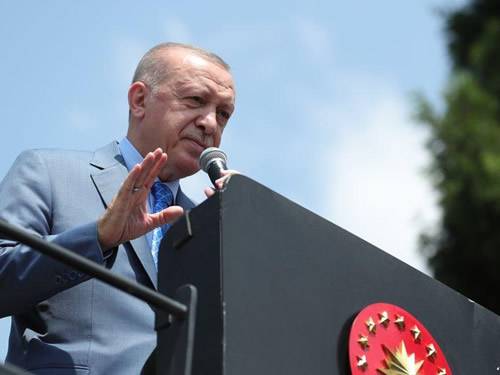
Turkey will carry on exploring for oil and gas in the eastern Mediterranean, Turkish President Tayyip Erdogan said on Friday in comments that may revive tensions with the European Union and Greece amid attempts to repair their frayed ties.
Turkey is at odds with EU members Greece and Cyprus over energy resources and jurisdiction in the region, and tensions flared last year when Turkish and Greek navy frigates escorted vessels exploring for hydrocarbons.
Speaking in the northwestern province of Sakarya, Erdogan said Turkey had been receiving "signals of natural gas" in the eastern Mediterranean and vowed to continue defending Turkey's rights in the region.
"Whatever our rights are, we will take those one way or another. And we will carry out our oil exploration operations in the eastern Mediterranean, Cyprus, and all those seas," he said, without elaborating or providing a timeline.
EU leaders had threatened punitive measures against Ankara over its offshore activities but later froze those plans after Turkey withdrew a research vessel from contested waters.
Ankara has since been working to repair ties with the bloc and Athens.
After Turkey brought its Oruc Reis vessel back to port in November amid threats of EU sanctions, Ankara resumed direct talks with Athens after a five-year hiatus. The two sides have held two rounds of talks since January, but have said no immediate results should be expected.
Erdogan's comments came a week after the EU promised 3.5 billion euros for Turkey to continue hosting Syrian refugees until 2024. Ankara later dismissed it as insufficient and called on the bloc to take concrete steps to increase cooperation.
Brussels and Ankara also disagree over the divided island of Cyprus.
Turkish Foreign Minister Mevlut Cavusoglu warned on Thursday that it would resume operations in the eastern Mediterranean if the EU and United Nations did not take steps on equitable sharing in Cyprus, after informal U.N.-led talks in April yielded no significant results.
Ankara backs the breakaway Turkish Cypriot administration in the north and is the only country that does not recognize the Greek Cypriot government to the south.
Cyprus was split in two after a Turkish invasion prompted by a brief Greek-inspired coup in 1974.
Erdogan will visit northern Cyprus on July 20.
(Reporting by Tuvan Gumrukcu; Editing by Daren Butler and David Clarke)